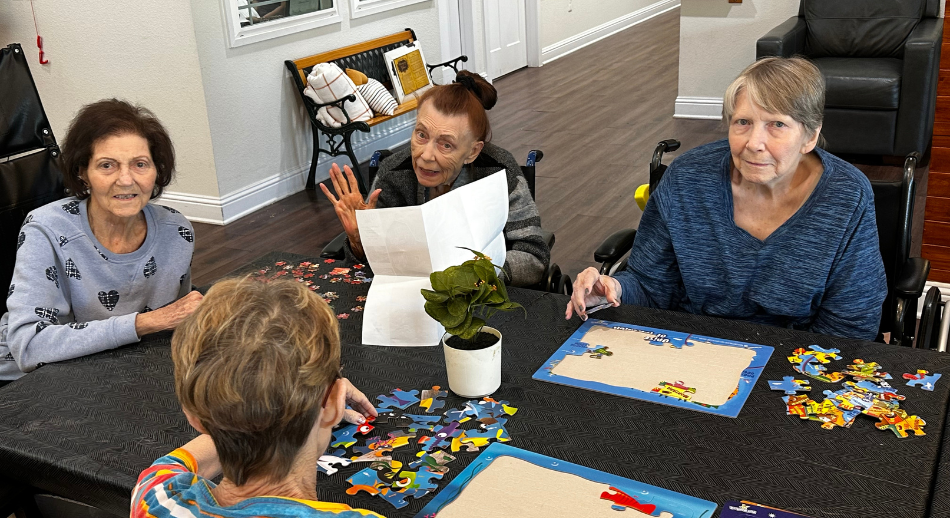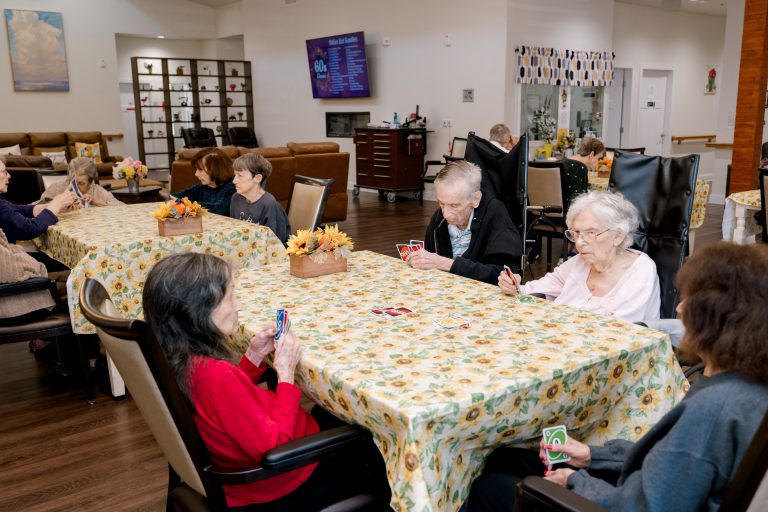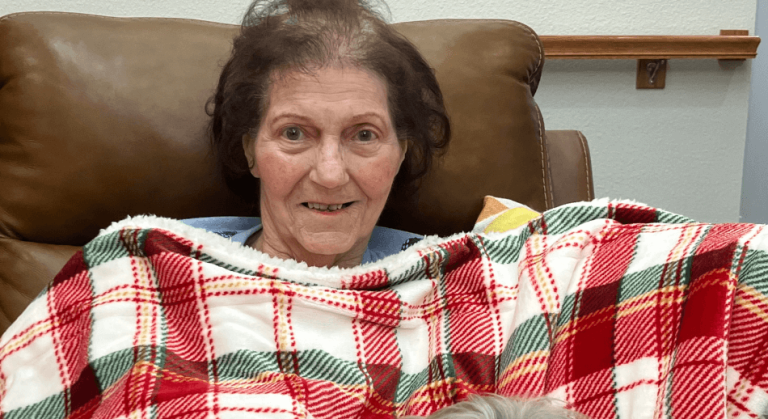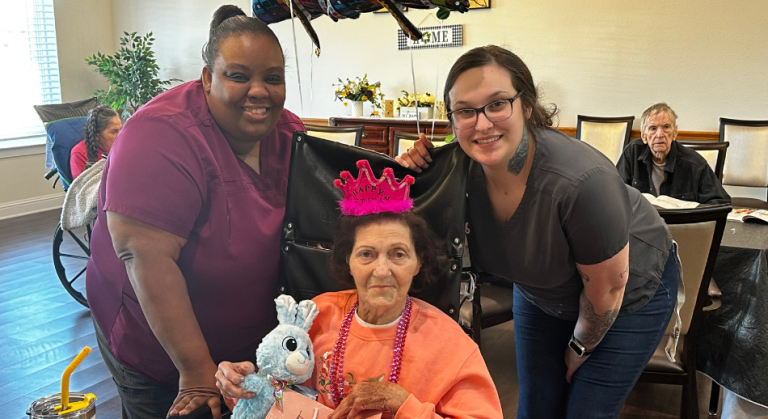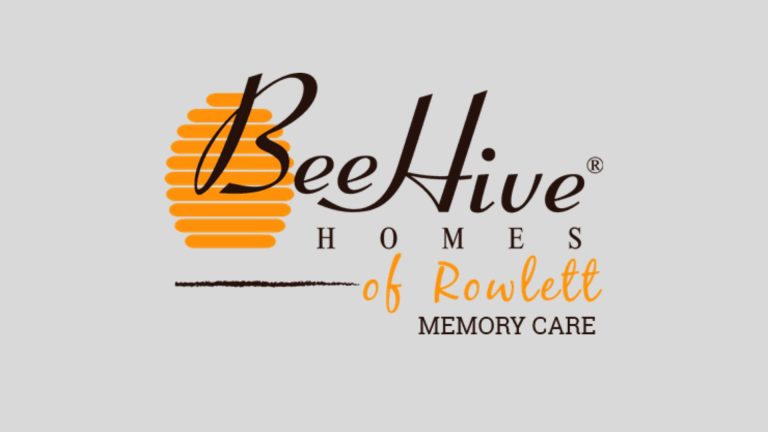Alzheimer’s Disease: A Comprehensive Overview
Alzheimer’s disease is a progressive and irreversible neurological disorder. It primarily affects seniors, causing a decline in memory, cognitive function. It also negatively affects the ability to perform daily activities. First identified by Dr. Alois Alzheimer in 1906, the disease has since become a major public health concern. It has an increasing prevalence as global populations age. Here our experts from Beehive Homes of Rowlett will provide a comprehensive overview of Alzheimer’s disease. We will cover its causes, risk factors, symptoms, diagnosis, treatment options, and ongoing research efforts. We will also discuss how a memory care service can help improve the quality of life.
Causes and Pathophysiology
Alzheimer’s disease is characterized by the accumulation of abnormal protein deposits in the brain. The two main types of proteins involved are beta-amyloid plaques and tau tangles. Beta-amyloid plaques form outside neurons. The tau tangles accumulate inside neurons. These abnormalities disrupt communication between brain cells. They trigger inflammation, leading to the progressive death of nerve cells.
Genetic factors also play an important role in Alzheimer’s disease. Mutations in certain genes, such as the APOE gene, have been identified as risk factors. Additionally there are lifestyle factors and environmental influences. A combination of genetic and environmental factors contribute to the development of the disease.
Risk Factors
Several factors increase the risk of developing Alzheimer’s disease. Age is the most significant risk factor involved. It has the likelihood of developing the condition doubling approximately every five years after the age of 65. Family history and genetics also play a role. As individuals with a first-degree relative (parent or sibling) with Alzheimer’s have a higher risk of developing the disease.
Other risk factors include cardiovascular disease, diabetes, head injuries, and a sedentary lifestyle. Research suggests that maintaining a healthy lifestyle is a good practice. This includes regular physical exercise, a balanced diet, and intellectual stimulation. This may help reduce the risk of developing Alzheimer’s disease. Good memory care services have several activities planned for seniors! Symptoms
The symptoms of Alzheimer’s disease vary. It generally progresses over time. Early signs may include difficulty remembering recent events, names, or faces, as well as challenges in planning and solving problems. As the disease advances, individuals may experience confusion, disorientation, and changes in personality and behavior.
Memory loss and cognitive decline significantly impact an individual’s ability to perform daily tasks. Language difficulties, impaired judgment, and difficulty recognizing loved ones are common symptoms in later stages of the disease. Ultimately, Alzheimer’s disease leads to a loss of independence and the need for round-the-clock care at a memory care facility. Diagnosis
Diagnosing Alzheimer’s disease involves a comprehensive evaluation of a person’s medical history. The evaluation of cognitive function and physical health is essential. Neurological exams, blood tests, and imaging studies such as magnetic resonance imaging (MRI) or positron emission tomography (PET) scans may be conducted to rule out other conditions.
Cognitive assessments, such as the Mini-Mental State Examination (MMSE) or the Montreal Cognitive Assessment (MoCA), help evaluate memory, attention, and language skills. A definitive diagnosis often requires post-mortem examination of the brain tissue to identify characteristic plaques and tangles. Treatment Options
While there is currently no cure for Alzheimer’s disease, several treatment options aim to manage symptoms and slow the progression of the disease. Medications such as cholinesterase inhibitors (e.g., donepezil, rivastigmine) and memantine are commonly prescribed to improve cognitive function and alleviate symptoms.
Non-pharmacological interventions, including cognitive stimulation, physical exercise, and occupational therapy, play a crucial role in enhancing the quality of life for individuals with Alzheimer’s disease. Caregiver support and education are also essential components of comprehensive care. Beehive Homes of Rowlett, a memory care facility is the best place to trust with a senior care Ongoing Research and Future Directions
Research into Alzheimer’s disease is ongoing, focusing on understanding the underlying mechanisms, identifying potential biomarkers, and developing novel therapeutic strategies. Advances in imaging technology, such as positron emission tomography (PET) scans and cerebrospinal fluid analysis, are aiding in the early detection of Alzheimer’s pathology.
Several promising drug candidates are undergoing clinical trials, targeting beta-amyloid plaques, tau tangles, and inflammation. Immunotherapies, gene therapies, and lifestyle interventions are also being explored as potential avenues for treatment and prevention.
Beehive Homes of Rowlett: Providing Compassionate Care for Your Loved Ones
Caring for aging loved ones can be a challenging and emotional journey. Families often seek memory care facilities that prioritize not only the physical well-being but also the emotional and social needs of their seniors. Beehive Homes of Rowlett is one such facility that stands out for its commitment to providing exceptional care in a warm and home-like environment. What Do We Offer?
Homelike Environment
Our home is designed to feel like a real home rather than a common memory care facility. The small, intimate setting fosters a sense of community and familiarity, creating a comfortable and secure environment for residents. Each resident has their own private room, offering a personal space where they can maintain a sense of independence and individuality.
Dedicated and Trained Staff
The staff at Beehive Homes of Rowlett is dedicated to providing compassionate and personalized memory care service to every resident. Caregivers undergo rigorous training to understand the unique needs of seniors, including those with memory issues like Alzheimer’s or dementia. The staff-to-resident ratio is carefully maintained to ensure that each individual receives the attention and care they deserve.
Personalized Care Plans
Recognizing that every resident is unique, Beehive Homes of Rowlett creates personalized care plans tailored to the specific needs and preferences of each individual. Whether it’s assistance with daily activities, medication management, or specialized memory care, the facility adapts its services to ensure residents receive the right level of support while maintaining their dignity and independence.
Nutritious and Delicious Meals
Proper nutrition is vital for the well-being of seniors. Our home understands this. The memory care facility provides well-balanced, home-cooked meals that cater to dietary restrictions and preferences. The dining experience is not just about nourishment; it’s also an opportunity for social interaction, creating a sense of community around the table.
Engaging Activities and Socialization
Beehive Homes of Rowlett places a strong emphasis on keeping residents engaged and socially active. A variety of activities, including games, outings, and group events, are organized to stimulate both the mind and body. Regular social interactions contribute to a sense of belonging and help combat feelings of isolation, fostering a positive and uplifting atmosphere.
Safety and Security
Ensuring the safety and security of residents is a top priority at Beehive Homes of Rowlett. The facility is equipped with modern safety features, including emergency response systems and secure entry points. Caregivers are trained to handle various situations, providing families with peace of mind knowing that their loved ones are in a secure environment.
Transparent Communication
Open and transparent communication is a cornerstone of the Beehive Homes of Rowlett philosophy. Families are kept informed about their loved ones’ well-being through regular updates, care conferences, and the availability of staff for any questions or concerns. This commitment to transparent communication helps build trust between the facility, residents, and their families.
Respect for Dignity and Independence
Maintaining the dignity and independence of residents is a core value at Beehive Homes of Rowlett. Caregivers work with residents to encourage autonomy in daily activities while providing support where needed. This approach promotes a sense of self-worth and enhances the overall quality of life for seniors.
Final Wrap
Alzheimer’s disease poses significant challenges to individuals, families, and healthcare systems worldwide. While current treatments provide some relief from symptoms, ongoing research offers hope for future breakthroughs in understanding, preventing, and treating this devastating condition.
Promoting awareness, early detection, and adopting a healthy lifestyle remain crucial in addressing the growing burden of Alzheimer’s disease. With concerted efforts from the scientific community, caregivers, and policymakers, there is optimism that advancements in research will pave the way for effective strategies to manage and ultimately conquer Alzheimer’s disease.

